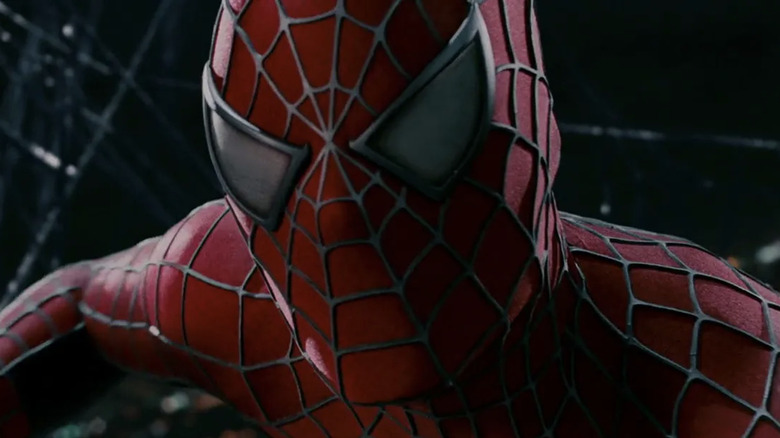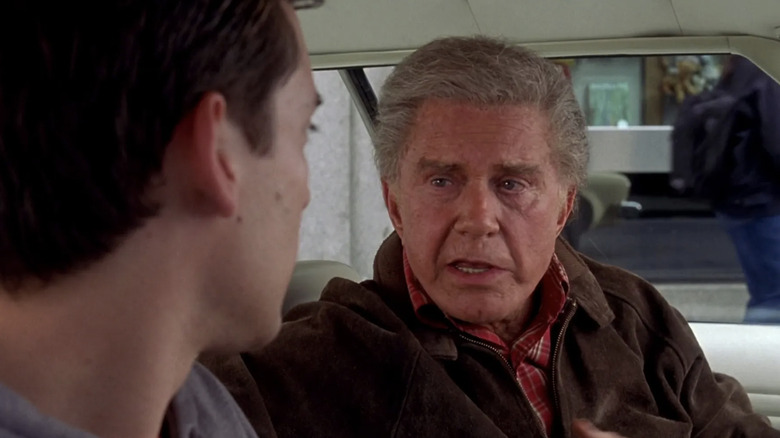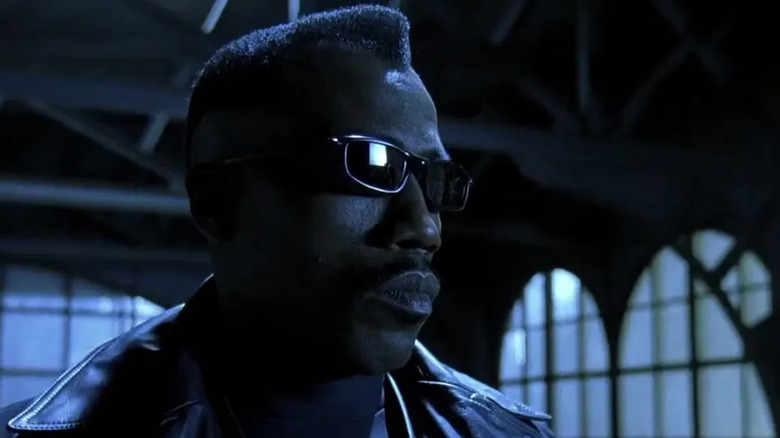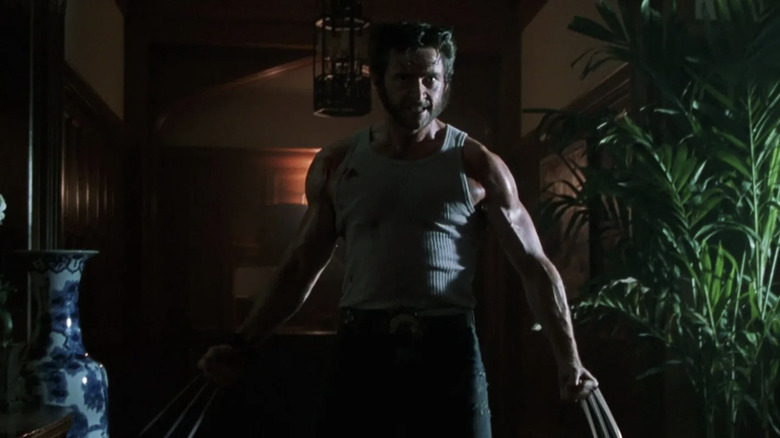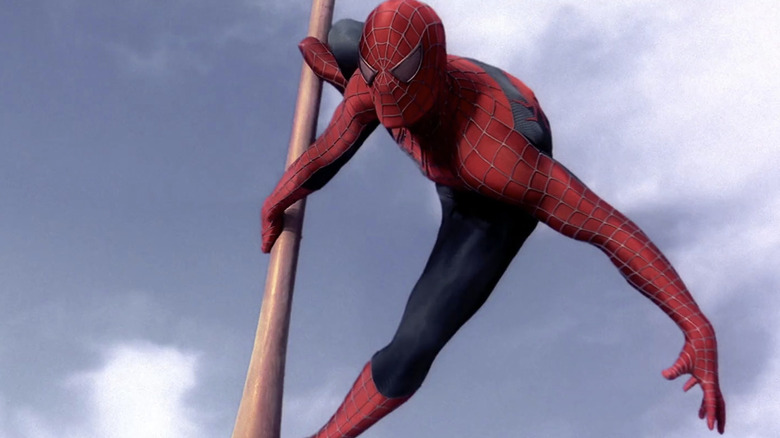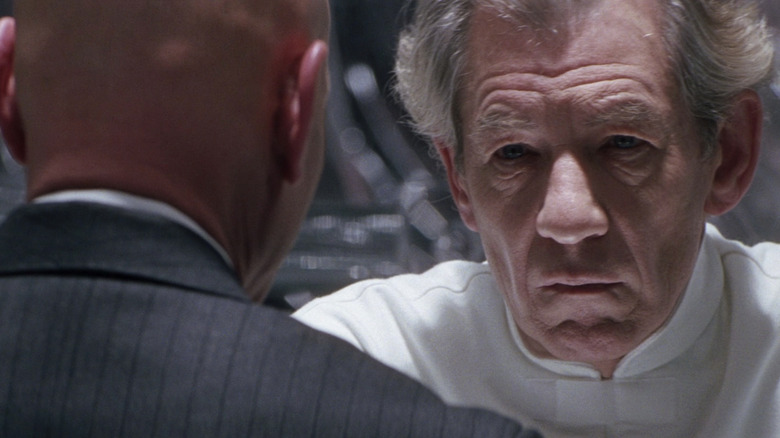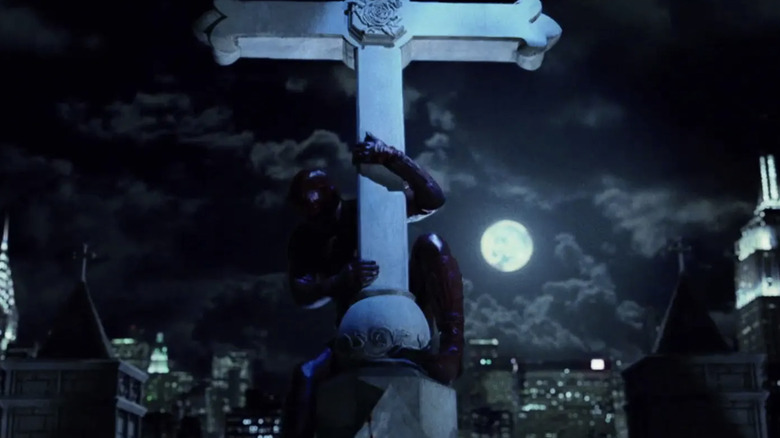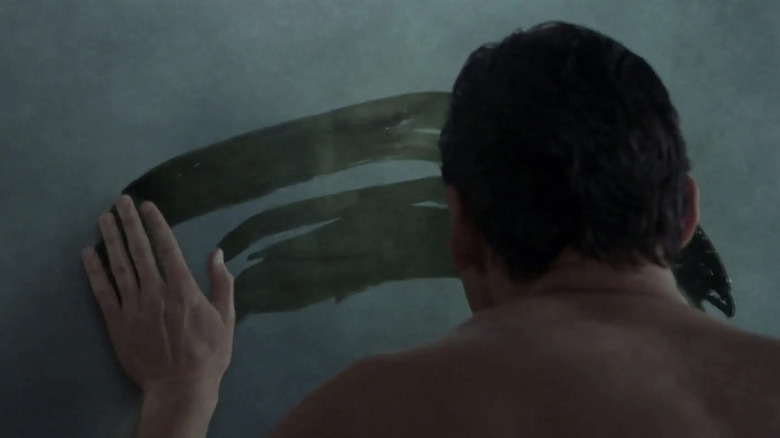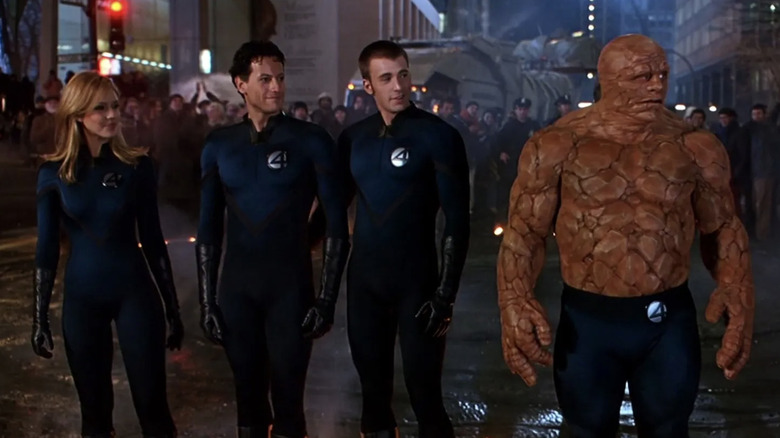Things The Older Marvel Movies Do Better Than The MCU
In the late 1990s, Marvel Comics sold the film rights to their biggest characters to keep themselves from going bankrupt, long before Disney bought out the company started the famed Marvel Cinematic Universe. In doing this, Marvel actually helped pave the way for the modern superhero movie long before "Iron Man" was released. This led to "Blade," "X-Men," "Spider-Man," and many of your favorite Marvel characters getting launched into the big screen in spectacular fashion. These movies proved there was a market for comic book movies after all. Of course, the MCU began with "Iron Man" and "The Incredible Hulk" in 2008, but there were plenty of Marvel trilogies and franchises before then to keep die-hard comic fans entertained. Many of them are still just as beloved today as they were back then.
While the special effects, costuming, and quality of superhero films (especially Marvel films) has certainly increased since Sam Raimi's original "Spider-Man" trilogy, there's no doubt that the old Marvel movies still hold their fair share of charm. The controversial truth of the matter is that there are plenty of things that the original Marvel films did much better than anything the MCU has done since. Don't believe us? The hype around "Spider-Man: No Way Home" and Raimi's "Doctor Strange and the Multiverse of Madness" seem to imply otherwise. But if you still need convincing, then take a look at all the things the old Marvel films did better.
Killer Origin Stories
There isn't a superhero film out there (at least on the Marvel side of things) that tells a more compelling and accurate origin story than the original "Spider-Man." Not only does it carry the heart of the original Marvel comic books on its sleeve, it combines the origin directly with one of Spidey's most formidable foes. Likewise, the 2005 "Fantastic Four" film, Ang Lee's "Hulk," and "The Punisher," among others, set their title characters up for success early on, establishing a clear origin story that often directly ties our heroes to their most iconic villains.
While MCU films like "Iron Man" and "Captain America: The First Avenger" stand out as solid origin stories, most MCU films skip their inception completely, instead diving right into the action to keep their audience's attention. That, or characters are introduced in another film before getting their own standalone, which also often skip the origin stories. This is a huge disservice to both the characters and the audience since Peter Parker watching his Uncle Ben die in "Spider-Man," Bruce Banner's flashbacks to his childhood in "Hulk," and Logan's frustrated attempts to uncover his own history in "X2: X-Men United" are what grounds and guides them as they become the superheroes we came to see in the first place. Plus, who doesn't love watching the Fantastic Four as they get hit with cosmic rays from space? That's one of the coolest parts!
Ahead of Their Time
Not only did the original "X-Men" and "Spider-Man" help launch the modern superhero movie, other Marvel ventures such as the "Blade" trilogy and "The Punisher" films pushed the R-Rated superhero boundary long before "Deadpool" and "Watchmen" came along. The original "Blade" and "Punisher: War Zone" in particular bring a dark and gritty energy to the big screen, expertly adapting the hardcore nature of their comic book stories for a modern audience. Of course, Blade and Punisher aren't exactly superheroes in the traditional sense, but they are iconic Marvel characters who work better with more mature features.
Many of the old Marvel films also created complex characters (heroes and villains) who weren't as one-dimensional as some we see in the MCU nowadays. Before "No Way Home," many considered Tom Holland's Spider-Man to just be "Iron Man, Jr." rather than a true adaptation of the Peter Parker character. Yet, films like "Spider-Man 2" remind us just how complex these characters actually are, and how their traumas only help them in their heroic journeys. This isn't even to mention that Wesley Snipes' Blade is the first Black Marvel Comics superhero to grace the big screen in his own film, years before Black Panther.
Taking the Source Material Seriously
There's no doubt that one of the things we love most about movies like "Guardians of the Galaxy" and "Thor: Ragnarok" is the humor. The blend of character growth with self-deprecating jokes is a true-blue staple of the MCU, and for good reason — it works! In fact, many of us rewatch these films over again just for the laughs. But the old Marvel films took a different approach. While there are clear moments of levity in "X-Men," "Spider-Man," and "Daredevil," the films don't allow the humor to hold them back from telling more refined stories. Raimi's "Spider-Man" trilogy is the perfect example of blending Spidey's humor with compelling stories that feel honest, raw, and genuinely human.
Of course, we have to mention how Ang Lee's "Hulk" dove directly into Bruce Banner's psyche, exposing his history with abuse and his darkest fears ("The Incredible Hulk" does this also, but the MCU completely ignores it). Honestly, "Hulk" feels a lot more like "King Kong" or "Frankenstein," which makes sense given the character's origins. Along the same lines, the "X-Men" series developed Hugh Jackman's Wolverine in ways that no MCU character has, simply by taking the character and his mythos seriously rather than making a joke out of them. The only reason an incredible film like "Logan" (which is clearly not MCU) could have even been made is because of the groundwork they'd laid with the character years prior.
Iconic Stand-Alone Films
One thing the old Marvel movies really had going for them was that they were truly stand-alone. You didn't have to watch "Ghost Rider" to understand a scene or two in "X-Men: The Last Stand," and that's something of a lost art nowadays. We've all gotten so used to interconnected stories and universes that we expect them now at every turn. Even Matt Reeves, director of "The Batman," is being asked when Superman will show up alongside Robert Pattinson's Dark Knight. Well, if you prefer stand-alone comic book stories that are truly set apart from other properties, then old Marvel is for you!
Aside from the "X-Men" and "Blade" films, which really build off each previous installment, most of the old Marvel flicks can be consumed on their own. "Spider-Man 2" is just as great if you haven't seen the first film as it is if you have, and even "Elektra" isn't completely bound by the "Daredevil" film she first appeared in. If "Captain America: Civil War" proved anything, it's that sometimes being too interconnected can hurt the growth of your primary characters, and that's not something the old Marvel films had to worry about. Rather, each made sure to focus on their own localized story before expanding the world around them.
The Hero/Villain Dynamic
Since the foundation of the MCU, the franchise has struggled primarily with their villains. Aside from Loki, Thanos, Killmonger, Vulture, and one or two baddies from the Netflix shows, most MCU villains aren't terribly compelling, interesting, or even believable. Most of them don't stand out as anything other than pale imitations of their heroes, and not in a good way. The old Marvel films, however, understood their villains completely: Magneto, Doctor Doom, Green Goblin, Kingpin, David Banner, Doc Ock, William Stryker, Sabretooth, etc. These films had a master catalog of Marvel villains for the choosing.
Of course, there were a few duds (looking at you, Galactus), but they were few and far between. Most of the time, our heroes' main foes were dark, mirky reflections of themselves, and not just because they had a similar Stark Tech suit of armor. Rather, they made similar choices to our heroes, but with different results, often warping their own perspectives of truth and justice to fit their own agendas. The dichotomy between characters like Spider-Man and Green Goblin, Professor X and Magneto, and Reed Richards and Victor von Doom is fascinating, powerful, and full of surprises. In fact, some of these villains are so iconic, so masterful, that they even brought a bunch of them back for "Spider-Man: No Way Home."
Philosophical and Moral Themes
The old Marvel movies also dealt with a completely different set of philosophical implications than most in the MCU. While "Iron Man" focuses heavily on "War On Terror" politics and the "Captain America" films reference PATRIOT Act surveillance, earlier Marvel pictures went for more universal, down-to-earth themes that dove into sociology, philosophy, and even religion. Like the original Marvel Comics before them, the "X-Men" trilogy ran underlying themes of equality, hoping to remind us that people should be treated the same whether they have a different in appearance or ability. This was ultimately the message that Stan Lee and co. hoped to convey with their famed mutant characters, and the Fox films handled it masterfully.
The "Spider-Man" trilogy heavily promotes moral notions of responsibility, which stand out among all superhero films as being some of the most powerful ideas explored in the genre (and are still being explored in Spider-Man films to this day). The "Daredevil" film even touches on Matt Murdock's Catholicism and how his role as Hell's Kitchen's "Guardian Devil" is heavily influenced by his faith, while "Ghost Rider" explores the moral and spiritual implications of selling one's soul. Likewise, "Fantastic Four," much like the MCU's "Guardians of the Galaxy" now, promotes the idea that you can find your "true family" through friendships. The old Marvel films just had a depth to them that has yet to be fully replicated.
Genuinely Moving Scores
Aside from the theme from "The Avengers," and maybe a track from the first "Captain America" or MCU "Spider-Man" movies, no score from the MCU has stood out as anything exceptional. In a world where Hans Zimmer, John Williams, and Michael Giacchino compose some of the most masterful works for franchises like "Dune," "Star Wars," and "Jurassic World," it seems strange that the MCU wouldn't strive for more recognizable, or at least exciting, musical themes to compliment their films. The scores from the older Marvel pictures, on the other hand, often stand out as being some of the best superhero themes of all time, and that's no small feat. They did exactly what scores are supposed to do, compliment our hero's journey and reveal their mental states.
Of course, Danny Elfman's original work on "Spider-Man" is among the most popular of all the Marvel films (and most superhero films in general), with the triumphant theme always captivating our ears. Elfman's work on "Hulk" is particularly interesting as well, ushering us into the mind of Bruce Banner as he fights his inner monster. Likewise, John Ottman's work on the "X-Men" series perfectly compliments each movie he composes. In fact, his work was so well-received, that when the original trilogy got a sequel in "X-Men: Days of Future Past," he returned to score the film. Ottman's stellar work on both "Fantastic Four" films and Graeme Revell's on "Daredevil" should also be noted.
Explosive Soundtracks
There's one area in which there's no question that the old Marvel films have the upper hand, and that is their explosive hard rock soundtracks. There was a time in the early 2000s where just about every superhero film had their own soundtrack album, featuring some of music's hottest bands and hardcore tracks. This is (sadly) an art form that is completely lost on modern superhero features (except for "Guardians of the Galaxy"). "Iron Man 3" and "The Avengers" were the last big Marvel pictures to have an explosive soundtrack, giving the oldies the upper hand here.
Who could forget Velvet Revolver's "Come On, Come In" music video in conjunction with "Fantastic Four"? Or what about that scene in "Daredevil" where Elektra prepares to kill our hero to the sweet sounds of Evanescence's "Bring Me To Life"? This isn't even to mention "Hero" by Nickelback's Chad Kroeger, the killer track that was released alongside the original "Spider-Man" back in 2002, or that "Ghost Riders in the Sky" cover by Spiderbait from, you guessed it, 2007's "Ghost Rider." There are countless others to note of course, including Seether's "Broken" from "The Punisher" and Fuel's "Won't Back Down" from the "Daredevil" album. Truthfully, the entire "Fantastic Four" and "Spider-Man 2" albums are pure gold and worth listening to on repeat. You won't be sorry.
